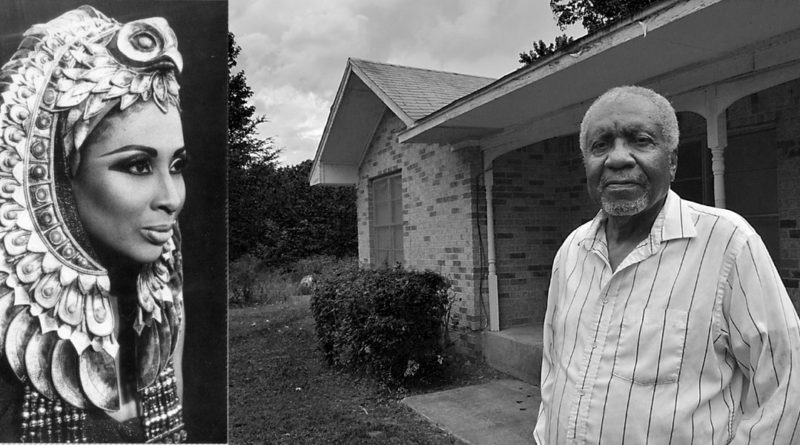Contrasting Backstories frame Star’s Life

NTCC at CHAPEL HILL – At first glance, “there are two contrasting accounts of Barbara Conrad’s childhood,” said Northeast Professor Dr. Andrew Yox. His Honors Program students are plunging into the life of a woman whose Mezzo Soprano voice shattered lines of race in favor of beauty.
Believed to have been born into the rise of a utopian enclave between Pittsburg and Lone Star, Barbara Smith took her father’s given name when she first sang to the tune of Conductor Harry Rudel’s Metropolitan Opera of New York.

“His story was somewhat similar to Barbara’s in that his family escaped Nazi persecution in Vienna,” Dr. Yox said. “He was her big break. Barbara evinced a sense that she had a crush of Rudel, but never dated him. He was married.”
Her New York performance launched fame, brought riches and the attention of swindlers and con artists scripted into the plot of the Honors Program’s seventh production featuring East Texans who’ve shaped the larger American tale.
Daingerfield Congressman Morris Sheppard unwittingly sparked the American rise of organized crime by championing morality with the 1919 passage of Prohibition.
The last populist of the agrarian age, Cass County native Wright Patman battled the Washington elite.
Cast center stage to international acclaim, Barbara Conrad spun stories of her roots, describing an enlightened community where she was born into generations of educators. Established by freed slaves, within a decade of the Civil War’s end Center point bloomed when Willie Johnson was the first to settle in the piney forest east of Pittsburg.
Her back story was epic and true, describing a community driven by learning, aspiring, building libraries with thousands of books and dormitories to house students coming from across Texas, from Chicago, from the Eastern Seaboard States.
“After they built the girls’ dorm, the building class hauled rock from Couch Mountain to build the boys dorm,” said 1950 Center Point graduate Edgie Reeves.
In the 1920’s, Center Point was one of two rural schools in Texas earning state accreditation, according to the American Educational History Journal.
What Barbara Conrad didn’t speak of was another life in the strictly segregated era at small town Queen City in Cass County where family secrets still speak of her school teaching father being driven from town. Plunging into the story, Dr. Yox’s researching students have yet to find any mention she made of the mystery teacher who first groomed her singing voice.
“I remember the first time she sang opera for the school,” said Jimmy Smith, a half-brother who thought she was a cousin, a vague relation. “She was maybe 14 or 15. I was in grade school. We thought it was funny, thought it was supposed to be a joke. We called it yodeling.”
Thirty years later he was driving a city bus in Dallas when she came from New York to see him.
“I had no idea she’d kept track of me all those years,” he said. “She called out of the blue and said she had something to tell me.”
Deeper than the protocol of segregation, Queen City was the set of family scandal that built barriers dividing lives. It was a core memory she was told to forget.
“In public recounting of her life, Barbara wanted to be associated with the African American experience at Center Point,” Dr. Yox said. “She wanted to blot out the separation of her parents. She wanted to present herself as an authentic connection of that place where she was secure, where she found beauty in life.”
While it was a curiosity, Jimmy Smith wondered little why his mother’s family name was Stiger. She had a brother who at times seemed fatherly. Leaving him with her mother, he was a year old when she went to California.
“A friend writing back home told her she could get work cleaning houses for rich people,” he said. He was 14 when she came home with two new children.
He escaped the sawmill where he worked as soon as he could. High school diploma in hand, he left for the army in 1960, promising to come home to the girl he loved. He worked in aviation electronics.
Nearing 60 years later, memories of the army are memories of a fine life.
“Everybody was the same,” he said. “The next guy was just the next guy.”
Hope soared again in the 1980’s. He was a member in good standing of an extended brotherhood, the force of the mostly black Dallas City bus driver’s union when they went out on strike for health benefits.
Four drivers had died behind the wheel – the down side of that deal was Jimmy Smith learning that his hard drinking fast living lifestyle had him in prime condition for the same fate.
The strike was crushed. The union band and it was a sobering thing.
He’d come home to find the girl he loved when he left for the service had left him. His first marriage floundered and dissolved.
He was in the first year of a long hopeful turn of life when Barbara Conrad came to Dallas. She was beautiful, rich, famous and she opened her genteel heart.
They had the same father, she said. Conrad and her mother, Jerri Lee Cash-Smith, had been teachers in Queen City. Jimmy’s mother was one of Conrad’s students.
His first grade teacher was her mother.
“I’m not sure that I remember it as it was, but I believe I remember being in first grade and wondering why I’d look up so many times and see the teacher watching me,” he said. “Just watching.”
It explains things he’s since come to know, events echoing back to Barbara Conrad’s life at Center Point.
“I remember it still,” said Center Point alumni Edgie Reeves. “Conrad Smith had left Cass County and come to Center Point. Barbara and her mother came to visit on weekends.”
The house that had been the Smith family home at Queen City was moved to Center Point. During the weeks of the school year, Barbara and her mother lived in a rented room back in Queen City.
Jimmy Smith had another half sister, Connie. She was in New York, where the daughters brought their mother and his first grade teacher after she began developing dementia.
“They took care of her for ten years,” he said. Once, he drove up to New York to help for a month. It was an eye-opening trip. There was an apartment overlooking Times Square, a “Brownstone” in the “arts” district.
An unfolding epic, it was the opening of an extraordinary trip, a mix of love, loyalty and edges of resentment. He had two half brothers. Denard graduated Columbia. Howard was in Colorado.
“I resent the years I didn’t know,” Mr. Smith said. “I wish I could have been there.” He wonders if he might have helped.
“Barbara Conrad was twice a victim,” Dr. Yox said. “Race deprived her of her first role in an opera. She struggled for ten years in New York before Rudel cast her in the limelight.”
In the late 70’s, a failed marriage wiped out her first fortune.
“When she was in her 70’s she was again robbed by an unscrupulous fellow opera singer and her lawyer who seized her assets and sent her to a state-run facility in New Jersey,” Dr. Yox said.
She trusted the wrong people, said Jimmy Smith, who 15 years ago came home to the house her family had long ago moved from Cass County to Center Point.
His anchor here is the Cash family bloodline that drove the story Barbara Conrad told.
Hired in 1900 as the first teacher and principal team, it was 1908 before Christine and Larry Cash had textbooks for students from three communities packing a two room school.
In 1911 when her husband resigned, Christine Cash became principal. She held no degree until graduating with honors at Bishop College in 1926. In 1943 she received her masters and in 1947 she was awarded a doctorate of philosophy from the University of Wisconsin.
In 1916 she championed passage of a school bond. The new school included five classrooms, three cloak rooms and a chemistry lab, as the story’s told in Center Point School: 1889-1952.
With the new school completed, attention turned at once to trades and industrial arts with curriculum that included farming, carpentry, cabinet making, blacksmithing and mechanical trades. More than attending school, the drive of students built the school.
“The boys hauled rock from Couch Mountain to build the second dorm,” Edgie Reeves said. “Dr. Cash got things done.”
The shop class built the school’s first bus on a truck frame.
“Dr. Cash brought our communities together,” Mrs. Reeves said. “I rode the bus from Lafayette.”
Falling under local jurisdiction channeled through the Texas Education Agency, in 1952 Center Point consolidated with the school in Pittsburg.
In her early years in New York, Barbara Smith became Barbara Smith Conrad, a prodigy, a student of music, dance and drama. Adventures beyond New York sent her abroad. She sang at the White House. In Austin, where race had once denied her chance to perform, she returned to honor at the capital. She was buried in Austin.
The next of the series of films made at Northeast Texas Community College and shown at conventions of the Texas Webb Society, the Great Plains Honors Council and the National Collegiate Honors Council will be shown here next February.
After the Center Point school was closed, Theoatis and Edgie Reeves bought the property, aspiring to preserve a memory that’s rich, unique to the people Barbara Conrad spoke of, the place where Dr. Christine Cash developed reality from a community’s vision.
“It’s so genuinely native to our region,” said Dr. Yox, the guiding hand for the evolving script of a story and a woman to be understood more in the telling. “It was a place of black spirituals and culture she shared with the world.”





